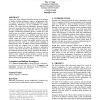Free Online Productivity Tools
i2Speak
i2Symbol
i2OCR
iTex2Img
iWeb2Print
iWeb2Shot
i2Type
iPdf2Split
iPdf2Merge
i2Bopomofo
i2Arabic
i2Style
i2Image
i2PDF
iLatex2Rtf
Sci2ools
121
Voted
ICFP
2003
ACM
2003
ACM
Software is discrete mathematics
A three-year study collected information bearing on the question of whether studying mathematics improves programming skills. An analysis of the data revealed significant differences in the programming effectiveness of two populations of students: (1) those who studied discrete mathematics through examples focused on reasoning about software and (2) those who studied the same mathematical topics illustrated with more traditional examples. Functional programming played a central role in the study because it provides a straightforward framework for the presentation of concepts such as predicate logic and proof by induction. Such topics can be covered in depth, staying almost entirely within the context of reasoning about software. The intricate complexities in logic that mutable variables carry with them need not arise, early on, to confuse novices struggling to understand new ideas. In addition, because functional languages provide useful and compact ways to express mathematical concep...
Functional Programming Concepts | ICFP 2003 | Keywords Functional Programming | Mathematics Improves Programming | Programming Languages |
Related Content
| Added | 13 Dec 2009 |
| Updated | 13 Dec 2009 |
| Type | Conference |
| Year | 2003 |
| Where | ICFP |
| Authors | Rex L. Page |
Comments (0)

